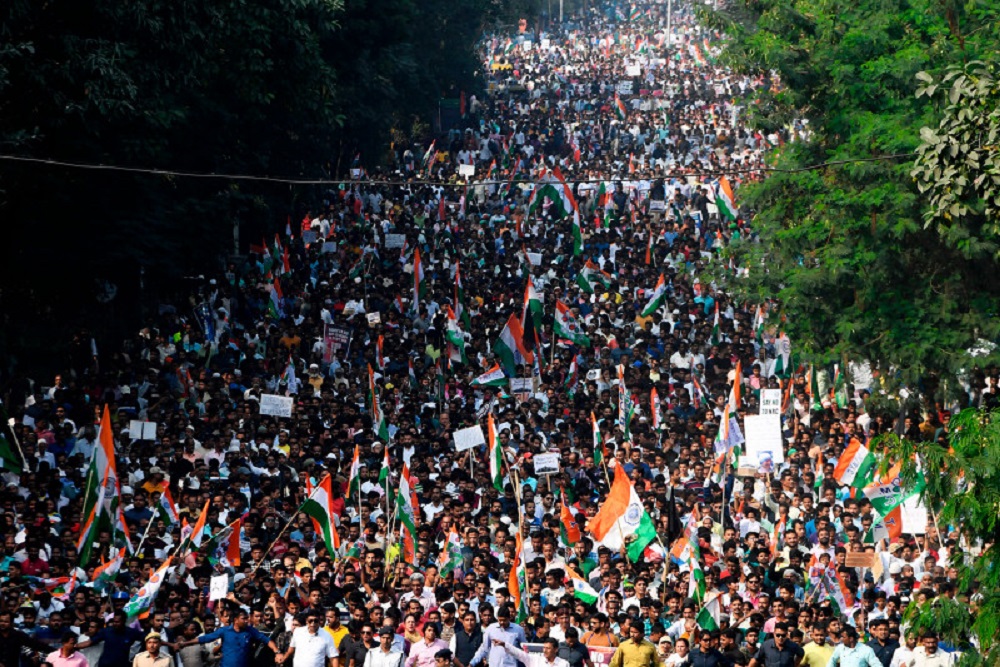Anger from India’s newly enacted citizenship law has led to massive protests in India’s capital Delhi and continues to spreads across the country.
According to reports, protests have erupted from Kolkata and Guwahati in the east to Mumbai in the west, and from New Delhi in the north to Chennai and Hyderabad in the south, tens of thousands of protesters across India are voicing their opposition against the controversial new citizenship law.
At least five people have been killed and several protesters including officers have been injured during the protests. In New Delhi, protesters have been on the streets for three straight days.
Protests broke out across nine states, including in major cities such as Kolkata, Mumbai, Chennai, Hyderabad and the capital New Delhi, mostly around university campuses.
In Delhi, students began demonstrating at the prestigious Jamia Milia Islamia University, with over 2,000 people taking part in the protests.
According to Najma Akhtar, the university’s vice-chancellor, hundreds of people were injured in the protests, and dozens arrested, as well as significant damage to the campus.
The protest comes days after clashes between police and protesters in Delhi left at least 50 people injured.
Jamia Millia Islamia crackdown
The Jamia Millia Islamia has filed a complaint with police in connection with the police crackdown on the campus on Sunday night.
According to the spokesperson of the university, a complaint has been sent to the SHO of Jamia Nagar police station, a copy of which has also been sent to the Deputy Commissioner of Police (DCP) of the southeast district.
The university’s vice-chancellor also said it would file a complaint against unidentified persons who had entered the campus, damaged property and harassed students.
Delhi: Indian Youth Congress carries out a torch rally, in protest against the incidents at Jamia Millia Islamia and Aligarh Muslim University. Congress leader Harish Rawat is also participating in the protest march. #CitizenshipAmendmentAct pic.twitter.com/LIjjr7loya
— ANI (@ANI) December 17, 2019
The Delhi Police has named former Congress MLA Asif Khan as an accused in its FIR on the Jamia violence on 15 December, officials said on Tuesday.
The ex-MLA has been named along with six other accused, they said.
The other six accused persons have been identified as local politicians Ashu Khan, Mustafa and Haider, AISA member Chandan Kumar, SIO member Asif Tanha, and CYSS member Kasim Usmani, police said.
India Citizenship Amendment Act
The Citizenship Amendment Act, which passed both houses of parliament last week and then was signed into law by India’s president, allows persecuted minorities a fast-track route to Indian citizenship.
The law as earlier reported applies to immigrants from nearby Afghanistan, Pakistan, and Bangladesh who are Hindu, Christian, Sikh, Jain, Zoroastrian, or Buddhist.
Muslims, however, were not included nor does the law apply to other persecuted minorities in the region, such as Tamil Hindus in Sri Lanka, Rohingya Muslims in Myanmar, or Uighur Muslims in China.
The top leaders of the ruling Bharatiya Janata Party (BJP) have claimed that the bill does not discriminates against Muslims. However, BJP President Amit Shah has repeatedly made clear his desire to crack down on Muslim immigrants.
Indian Prime Minister Narendra Modi has said that Muslims are not minorities in India, and this has raised concerns about the bill’s constitutionality and the growing anti-Muslim feelings in the country.
He has expressed his sadness regarding the ongoing protest describing it as unfortunate and deeply distressing.
Violent protests on the Citizenship Amendment Act are unfortunate and deeply distressing.
Debate, discussion and dissent are essential parts of democracy but, never has damage to public property and disturbance of normal life been a part of our ethos.
— Narendra Modi (@narendramodi) December 16, 2019
His Bharatiya Janata Party (BJP) has also described the citizenship bill as a means of protecting vulnerable groups from persecution.
Modi sought to reassure citizens Monday, saying in a statement that the new citizenship bill will not affect any citizen of India of any religion.
What is citizenship for?
Citizenship is a compulsory element in most democracies throughout Europe, North America and the Pacific for a person to have exclusive privileges and responsibilities. There are mainly two ways to obtain citizenship, by birth or by “naturalization” by law.
Research suggests that political education in schools in western democracies emphasizes political institutions, rights, and responsibilities of citizens, debates on current issues and moralism in various combinations. Culture, which includes religion, is sometimes deeply embedded in the requirements for citizenship.
Education for citizenship raises key questions—what is education for? What is the role of the school in developing positive attitudes among young people?
Teaching English in Asia is a great way to get one’s foot in the door, as nearly all the countries will issue a work visa. Then it becomes much easier to pursue residency. There are quick requirements to get residency in Malaysia, the Philippines, South Korea, Thailand, and Vietnam.







